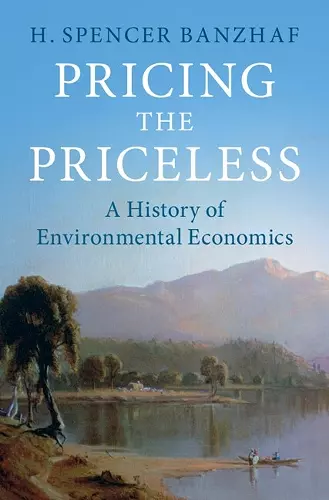Pricing the Priceless
A History of Environmental Economics
Format:Paperback
Publisher:Cambridge University Press
Published:2nd Nov '23
Currently unavailable, and unfortunately no date known when it will be back
This paperback is available in another edition too:
- Hardback£80.00(9781108491006)

This book tells how economics shifted from developing resources to valuing and incentivizing the preservation of natural environments.
Historians of social science will benefit from the detailed examination of how economics expanded into new areas like the environment. Environmental historians will benefit from an understanding of how economics claimed to be 'on the side' of the environment. Environmental economists will benefit from the contextualization of their field.While large literatures have separately examined the history of the environmental movement, government planning, and modern economics, Pricing the Priceless triangulates on all three. Offering the first book-length study of the history of modern environmental economics, it uncovers the unlikely role economists played in developing tools and instruments in support of environmental preservation. While economists were, and still are, seen as scientists who argue in favour of extracting natural resources, H. Spencer Banzhaf shows how some economists by the 1960s turned tools and theories used in defense of development into arguments in defense of the environment. Engaging with widely recognized names, such as John Muir, and major environmental disasters such as the Exxon Valdez oil spill, he offers a detailed examination of the environment, and explains how economics came to enter the field in a new way that made it possible to be “on the side” of the environment.
'Over the past 50 years, environmental economics has evolved from a small fringe of economics to a full-fledged sub-discipline, with many hundreds of practitioners populating academic institutions, multilateral organizations, national and sub-national governments, private firms, and non-governmental organizations. This unique book by Spencer Banzhaf portrays the nature, scope, and methods of economic analysis of environmental and natural resource issues through a decidedly historical lens, and thereby examines five decades of intellectual growth. Whether you are an economist, a student of environmental economics, or a skeptic of the ability of economics to provide insights about these issues, you will benefit from reading this book.' Robert Stavins, Harvard University
'Banzhaf's history brings environmental economics to life! He tells readers how the field evolved from real problems, the experiences and personalities of the people who demonstrated how economics could be used to address them, and the policy responses to what was found. He combines a deep understanding of the field with masterful skill in explaining how it developed. Years ago, he recounted that as a graduate student, he studied both environmental economics and the history of economic thought, because his dream was to integrate the ideas with their history. His book is truly a dream come true! Anyone who wants to study environmental economics should begin here!' V. Kerry Smith, Emeritus Regents Professor, Arizona State University, and University Fellow, Resources for the Future
'Spanning academic economics (including agricultural economics), government agencies, and think tanks, the history of attempts to value the environment has a complex history in which links between theory and practice go both ways. Spencer Banzhaf provides a readable and informative account that should engage anyone with an interest in this important field.' Roger E. Backhouse, Emeritus Professor of the History and Philosophy of Economics, University of Birmingham, UK
'How much do you want for that planet?' There are few questions of greater importance than how to value the environment. In this fascinating new intellectual history, Spencer Banzhaf charts the long-standing interest of American economists in the intangible benefits of the natural world. For better or worse, their successes and failures still reverberate in our moment of deepening crisis.' Fredrik Albritton Jonsson, The University of Chicago
ISBN: 9781108792066
Dimensions: 228mm x 152mm x 16mm
Weight: 430g
310 pages